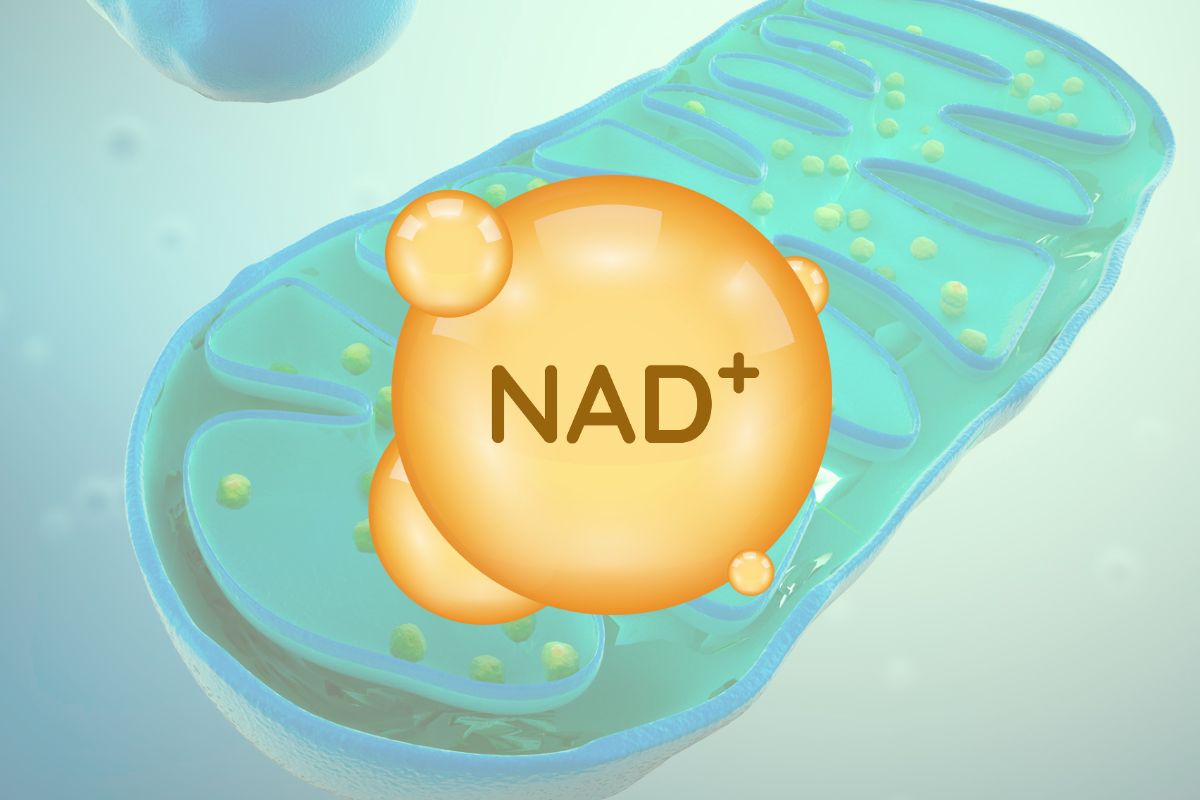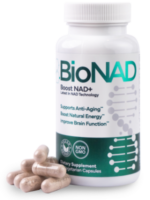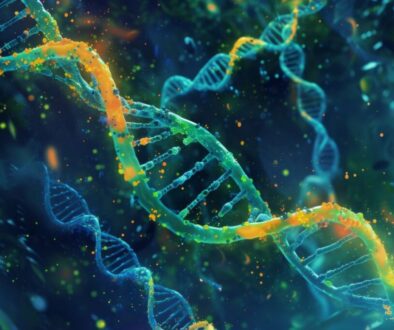Exploring The Role Of NAD+ In Cellular Respiration Processes

Published April 4, 2025
Every second, your body turns food into energy to keep you moving, thinking, and thriving. What if one key molecule made it all possible? The role of NAD+ in cellular respiration is critical. It’s the molecule that unlocks energy from your diet. This energy fuels every function in your body. Without it, the energy conversion process would halt, leaving your cells unable to perform their vital tasks.
In this article, we’ll explore the fascinating world of NAD+, emphasizing its critical role in cellular respiration. Understanding the role of NAD+ in cellular respiration is key to energy production. It helps generate energy at the cellular level, which can offer insights into optimizing energy production and improving health.
What Is NAD+?
NAD+ (nicotinamide adenine dinucleotide) is a crucial molecule found in all living cells. It functions as a coenzyme that enhances the efficiency of enzymes. At its core, NAD+ comprises two nucleotides—one containing nicotinamide and the other adenine—joined by phosphate groups.
This molecule is crucial for chemical reactions that help cells turn nutrients into energy. NAD+ works as an electron transporter during metabolism. It’s available in two forms: NAD+ (oxidized) and NADH (reduced). These forms continuously cycle during energy production, ensuring the flow of cellular metabolism.
The body maintains NAD+ levels through both internal synthesis and dietary sources. Fish, poultry, and fortified cereals support NAD+ production. Ingredients rich in tryptophan and niacin also play a role. A balanced diet is essential for maintaining this vital molecule.
Now that we know what NAD+ is, let’s explore its key role in cellular respiration and energy production.
The Role Of NAD+ In Cellular Respiration
Cellular respiration is a vital, multi-step process that constitutes glycolysis, the Krebs cycle, and the electron transport chain (ETC). At every stage, NAD+ plays an essential role in driving the production of ATP, the primary energy source for cells.
Glycolysis
Glycolysis is the first stage of cellular respiration. It happens in the cytoplasm. One glucose molecule is broken into two pyruvate molecules. NAD+ acts as an electron carrier during this process. It captures high-energy electrons and converts them into NADH. These stored electrons provide the energy needed to fuel ATP production later.
Krebs Cycle (Citric Acid Cycle)
Following glycolysis, pyruvate enters the mitochondria and feeds into the Krebs cycle. Here, NAD+ again takes center stage, accepting high-energy electrons to form NADH. Each cycle produces three NADH molecules, which carry electrons needed for the next step in cellular respiration.
Electron Transport Chain (ETC)
NADH molecules are produced during glycolysis and the Krebs cycle. Their prominent role is in the electron transport chain in the mitochondrial membrane. NADH donates its electrons to the ETC, driving the production of ATP through a series of energy conversions. As electrons are transferred, NADH is recycled back into NAD+, ensuring the continuation of the cellular respiration cycle. Without the regeneration of NAD+, this entire process would halt, depriving the cell of its energy source.
This shows how crucial NAD+ is for cellular function and energy balance. But why is NAD+ so important for cellular energy?
The Importance Of NAD+ For Cellular Energy
NAD+ plays a crucial role in energy generation within your cells. Each NADH molecule generates about 3 ATP molecules in the electron transport chain. ATP is the primary source of energy for your body.
Without enough NAD+, your cells can’t produce the energy needed. This affects essential functions like muscle contraction, brain activity, and cellular repair. Low NAD+ levels can cause serious problems, including fatigue, slower metabolism, and weaker immunity. They may also increase the risk of age-related health issues.
Research links declining NAD+ to obesity, diabetes, and neurodegenerative diseases. Maintaining healthy NAD+ levels is key to supporting vitality and long-term health.
Fortunately, there are natural ways to boost NAD+ levels and maintain energy. Let’s explore these strategies.

Naturally Boosting NAD+ Levels
Maintaining healthy NAD+ levels is essential for optimal energy production and metabolic health. Here’s how you can naturally enhance your NAD+ levels:
Dietary Sources
Boosting NAD+ production can be as simple as incorporating foods rich in niacin and tryptophan into your diet. Here are some excellent options to include:
- Fish such as tuna and salmon
- Poultry such as chicken or turkey
- Eggs
- Whole grains
- Mushrooms
- Dairy products
These nutrient-rich foods boost your body’s NAD+ levels. They also support overall health and well-being.
Lifestyle Habits
Your daily routines significantly influence NAD+ levels and overall cellular health. Here’s how:
- Exercise. Regular exercise increases NAD+ production. It activates key enzymes in the body. This is especially true in energy-demanding tissues like muscles.
- Fasting and Caloric Restriction. Intermittent fasting and calorie reduction can boost NAD+ levels. They improve cellular efficiency and trigger autophagy. Autophagy is the process of cellular renewal.
- Sleep. A consistent sleep schedule supports cellular health. This helps maintain balanced and sustainable NAD+ levels.
Supplementation
Supplements such as nicotinamide riboside (NR) and nicotinamide mononucleotide (NMN) can help increase NAD+ levels. They’re gaining popularity for potential benefits like more energy and anti-aging effects. However, more research is needed to confirm their effectiveness and safety.
Combining a well-balanced diet, healthy lifestyle habits, and supplementation, if necessary, allows you to effectively support and maintain your NAD+ levels for improved energy and overall health.
Frequently Asked Questions
What are the effects of depleted NAD+ levels?
When NAD+ levels drop too low, energy production in the body becomes insufficient, often leading to fatigue, brain fog, and a slower metabolism. Chronic depletion of NAD+ has also been linked to age-related illnesses and metabolic disorders.
How does NAD+ differ from NADH?
NAD+ is the molecule’s oxidized form, acting as an electron acceptor during metabolic reactions. NADH, in contrast, is the reduced form responsible for carrying energy-rich electrons to the electron transport chain for ATP production.
Can increasing NAD+ levels boost energy?
Elevated NAD+ levels enhance ATP production, the body’s primary energy source. This is why boosting NAD+ is frequently explored to combat fatigue and mitigate age-related energy declines.
Does aging impact NAD+ levels?
Absolutely—NAD+ levels naturally decrease with age. This decline reduces cellular repair and energy production. It contributes to aging and related health issues.
Are there risks to taking NAD+ supplements?
NAD+ supplements are generally safe. Some people may experience mild side effects from precursors like NR or NMN. These can include nausea or digestive discomfort. See a healthcare provider before starting, especially if you have pre-existing health conditions.
Why Choose BioNAD?
Maintaining healthy NAD+ levels is crucial for energy production, metabolism, and DNA repair. However, these levels naturally decline as we age, making supplementation an effective way to support overall health and vitality. BioNAD provides a scientifically crafted supplement designed to naturally enhance your body’s NAD+ levels, helping you stay energized and resilient.
Key benefits of BioNAD
- Natural NAD+ Enhancement. BioNAD’s unique blend boosts NAD+ production. It helps increase energy and improve metabolism.
- Activation of Sirtuin Proteins. BioNAD boosts NAD+ levels. This activates sirtuin proteins. Sirtuins are key to cellular health and longevity.
- Support for DNA Repair. Higher NAD+ levels improve DNA repair. This helps maintain genomic stability.
Incorporating BioNAD into your daily regimen can be a proactive step toward sustaining energy levels, promoting healthy aging, and supporting overall well-being.

Optimizing NAD+ For A Healthier, More Energetic You
The role of NAD+ in cellular respiration is crucial, as it serves as a primary driver of energy production in every cell of your body. Supporting your body’s NAD+ levels can boost energy metabolism and improve long-term health. Diet, lifestyle changes, and supplementation can help maintain these levels. Whether you want more daily energy or youthful vitality, focusing on NAD+ is a significant first step.
Consider investing in a reputable NAD supplement like BioNAD to help support your health and energy goals for optimal results.

Try BioNAD Now & Experience The Boost!
NAD+ (Nicotinamide Adenine Dinucleotide) is a crucial coenzyme found in every cell of your body, playing a vital role in cellular energy production and metabolism. BioNAD supplements aim to elevate your NAD+ levels, providing numerous health benefits.

About The Author
Meet Corinne Grace, a nurse with a passion for writing. Her expertise lies in health and wellness topics, where she blends academic knowledge with engaging story telling.

This Content Has Been Reviewed For Factual Accuracy
This content has undergone thorough fact-checking by our team of experts. Learn more about the editorial standard for our website here.




